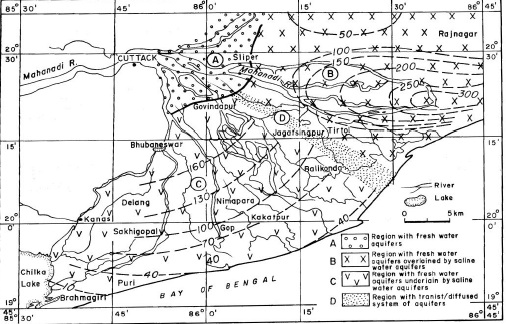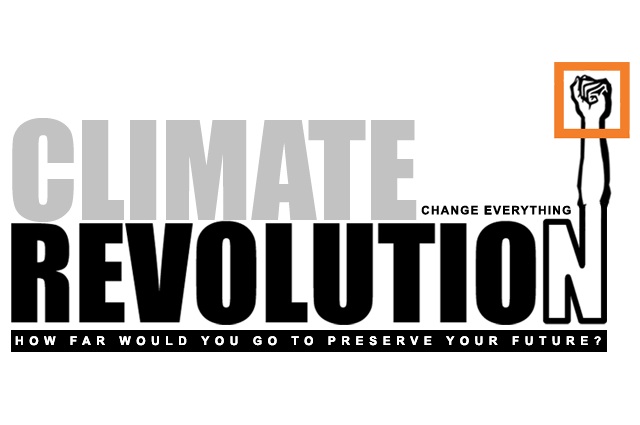Voluntary Citizen or Civil Society Sector
A study of saline freshwater interface phenomena in the Mahanadi delta region (Orissa)
Posted on 10 Jul, 2010 10:40 PM The subsurface aquifer systems in Mahanadi delta region in Orissa (India) is largely characterized by two groups of freshwater aquifer systems, both of which are prone to saline water mixing/migration with time and development:
The subsurface aquifer systems in Mahanadi delta region in Orissa (India) is largely characterized by two groups of freshwater aquifer systems, both of which are prone to saline water mixing/migration with time and development:
- The south western Mahanadi delta region is represented by unconfined to semi-confined freshwater aquifers underlained by brackish/saline aquifer systems with a diffusion boundary.
- The north eastern parts of Mahanadi delta is represented by deep freshwater confined aquifers overlained by brackish/saline water aquifers with aquitard/ aquiclude boundary.
Draft regulatory framework for wetlands conservation - Comments by ATREE
Posted on 09 Jul, 2010 11:49 PMThe Ministry of Environment and Forests released a draft of the regulatory framework for wetland conservation - Wetlands Conservation and Management Rules (2009) for feedback from all stakeholders. The draft framework was prepared by a multi-disciplinary expert group, and final round of comments were invited till June 21st 2010.
The Wetland Conservation Team of Ashoka Trust for Research in Ecology and the Environment (ATREE) did a detailed analysis of the draft regulation and submitted several pertinent concerns to the Ministry. The most significant observation is that the new framework (as do much of India's policies and laws) continues to propose unjustifiable State control and interventions over the country's wetlands and livelihoods of people dependent on them. The regulation does not make any constructive suggestions or recommendations for the conservation that the country's wetlands demand, and instead brings all wetlands into complete official control by installing Central, State and District-level wetland regulatory authorities, wherein the majority of the members will be senior government officials.
Recent technical literature relevant for the hydrologists of the country – A compilation by the National Institute of Hydrology
Posted on 01 Jul, 2010 04:10 PMThe report is a compilation of abstracts of hydrological literature from select national and international Journals for the period 1991-95. Though a sizeable number of Journals are published in the field of hydrology and water resources, scientists involved in different studies and projects find it difficult to go through all of them.
Recent technical literature relevant to the Hydrologists of the country – A compilation by the National Institute of Hydrology
Posted on 01 Jul, 2010 03:30 PMThe report is a compilation of abstracts and annotated bibliography of hydrological literature from select national and international Journals for the year 1996-97. Though a sizeable number of Journals are published in the field of hydrology and water resources, scientists involved in different studies and projects find it difficult to go through all of them.
Renukaji Dilli Ke Nalon Mein - A documentary about the movement against the proposed Renukaji Dam Project
Posted on 18 Jun, 2010 05:22 PMThe Renuka Dam Project proposed over the river Giri Ganga (a tributary of the Yamuna) located some 300km away from Delhi, is a joint project of the governments of Himachal Pradesh (HP) and Delhi, to be constructed by the Himachal Pradesh Power Corporation Limited (HPPCL) in Sirmaur district of HP.

Ek Phirangi Raja - Chutki Bhar Namak Paseri Bhar Anyay: The story of Frederick Wilson and the Great Indian Hedge
Posted on 18 Jun, 2010 12:33 AM Ek Phirangi Raja
Ek Phirangi Raja
In this essay, Romesh Bedi recounts the true story of Frederick E Wilson, a British army officer, who deserted the army after the Sepoy Mutiny of 1957, escaped to the Himalayas, and settled in Harsil, a remote village in Uttarakhand on the banks of the Bhagirathi.
Wilson makes a flourishing business from the export of skins, fur, musk from the region, and rips the local deodar forest, to cash in the growing demand for wooden sleepers during the expansion of the Indian railways by the British, which were sent down to the plains through the rivers. Wilson soon acquires a lease from the Raja of Tehri-Garhwal, for his timber business and keeps the Raja happy by giving him a share of the profits, and even begins to mint his own local currency, because of which locals start calling him Raja.
Love for green: Healing the hills with trees - Work of Sachidanand Bharti in Uttarakhand (Video)
Posted on 12 Jun, 2010 12:01 PMLove for green: Healing the hills with trees - Work of Sachidanand Bharti in Uttarakhand
From Tubaah (NDTV Network) website (November 26, 2008).
Sachidanand Bharti is known as the treeman in Uttarakhand, where he has been dedicatedly planting trees since the last 25 years. Hills in Uttarakhand were once barren, but now they are lush green, all due to his efforts. Bharti is a school teacher by profession but his real calling is as a climate crusader.

Activists from the Climate Revolution dig out climate policy gaps through the Right to Information Act
Posted on 10 Jun, 2010 07:27 AM Content Courtesy: AlertNet
Content Courtesy: AlertNet
Activists from the Climate Revolution initiative in India have discovered a crucial tool in their battle to hold the government accountable on its climate policies: the country's landmark Right to Information (RTI) Act.
Read more about Climate Revolution's work on RTI on their website here.
IEC in Jalswarajya Project (Maharashtra) - A guiding light for water supply sector
Posted on 01 Jun, 2010 11:51 PMIEC in Jalswarjya- A guiding light for WSSD, Govt. of Maharashtra
- An article based on vibrant experience of Jalswarajya Project
Prabhakar S. Mishra
IEC specialist, Nagpur
Introduction
Whenever we are working on development front we need to put communication at heart place. Worldwide past experience suggest that modernization approach of development communication fail to sustain impact on stakeholders due to its vertical one way format based on prejudice which fix responsibility of being backward on under develop class. Till end of 20th century mostly communication in development sector was argument and advocacy based. Also efforts initiated with expectation of switch effect behavioral change, that outcast trust from communication.
The power of uncertainty: Reflections on the nature of transformational initiatives - Malcolm Adiseshiah Centenary Lecture by Mihir Shah
Posted on 26 May, 2010 11:21 PMIn this lecture, the author makes connections between the concepts of certainty and uncertainty and draws parallels between these and the scientific or the positivist approach and the phenomenalist approach. The author argues that the excessive emphasis on certainty, which is an inherent assumption of the scientific approach embraces reductionism, compartmentalisation and has been the principle underlying all disciplines such as developmental economics.





